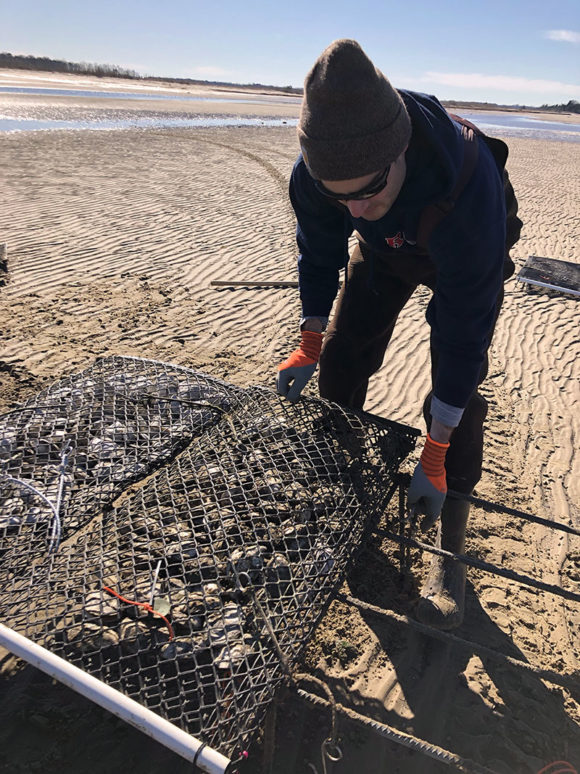
Graduate student Michael Whiteside working with Rutgers disease-resistant oysters at Cape Shore flats in Delaware Bay.
Rutgers Haskin Shellfish Research Laboratory (HSRL) was awarded a $592,390 NOAA Sea Grant to enhance bivalve aquaculture, which is important to the socioeconomic wellbeing of coastal areas that are depressed by the decline of wild fisheries.
Principal investigator for the three-year project, “Enhancing bivalve aquaculture through species improvement and diversification,” is Ximing Guo, professor and shellfish geneticist, with co-PIs Daphne Munroe, associate professor, HSRL; Lisa Calvo, shellfish aquaculture program coordinator; David Bushek, director, HSRL; Mike De Luca, director of the Rutgers Aquaculture Innovation Center; and Peter Rowe, director of research and extension, NJ Sea Grant).
Bivalve aquaculture is one of the most important aquaculture industries in the U.S. and globally. In New Jersey, it is dominated by oyster farming in Delaware Bay and hard clam farming in coastal bays. However, both species are threatened by diseases. While disease-resistant stocks have been developed for eastern oyster aquaculture, most of the selected stocks so far are developed for low-salinity estuaries.
Under the NOAA Sea Grant project, the team of researchers will focus on developing superior eastern oyster stocks that survive and grow well in high-salinity environments.
In addition, it will improve growth of bay scallops to enable same-year harvest, as well as develop surfclams with fast growth and heat tolerance to enhance survival and enable early harvest. A key component of the project, which ends in 2020, will be to communicate the results of the research to New Jersey and regional shellfish farmers.
Guo and Calvo also received a grant from NOAA National Marine Fisheries Service (NMFS) to develop superior triploid oysters for high-salinity coastal bays of New Jersey and the Northeastern region. This two-year grant, valued at $281,080, was awarded under the Saltonstall-Kennedy program of the NMFS and will conclude in 2020.

